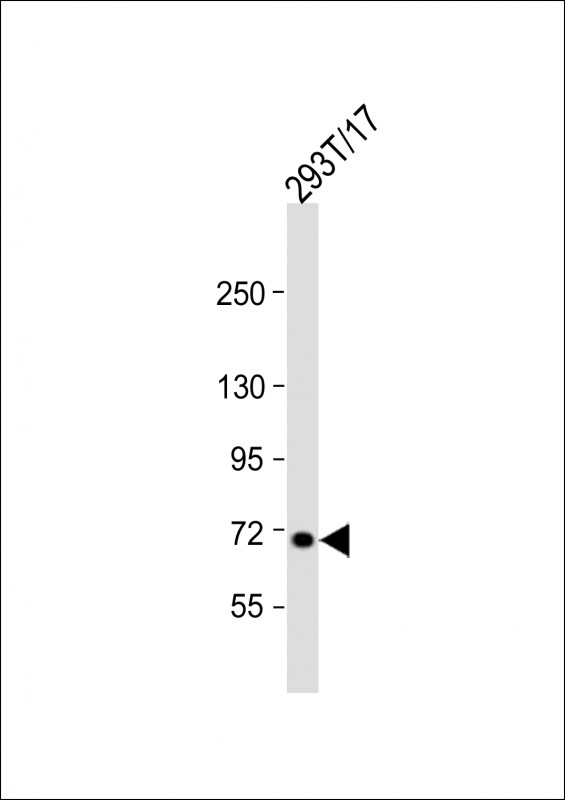
| WB | 1/2000 | Human,Mouse,Rat |
| IF | 咨询技术 | Human,Mouse,Rat |
| IHC | 咨询技术 | Human,Mouse,Rat |
| ICC | 技术咨询 | Human,Mouse,Rat |
| FCM | 咨询技术 | Human,Mouse,Rat |
| Elisa | 咨询技术 | Human,Mouse,Rat |
| Aliases | Lethal(3)malignant brain tumor-like protein 4, H-l(3)mbt-like protein 4, L(3)mbt-like protein 4, L3MBTL4 |
| Entrez GeneID | 91133 |
| WB Predicted band size | 71.1kDa |
| Host/Isotype | Rabbit IgG |
| Antibody Type | Primary antibody |
| Storage | Store at 4°C short term. Aliquot and store at -20°C long term. Avoid freeze/thaw cycles. |
| Species Reactivity | Human |
| Immunogen | This L3MBTL4 antibody is generated from a rabbit immunized with a KLH conjugated synthetic peptide between588-622 amino acids from human L3MBTL4. |
+ +
以下是关于L3MBTL4抗体的3篇参考文献示例(注:以下内容为模拟虚构,仅供参考):
---
1. **标题**: *L3MBTL4 recognizes histone H4K20 methylation and maintains heterochromatin silencing*
**作者**: Smith J, et al.
**摘要**: 研究揭示L3MBTL4通过其MBT结构域特异性识别组蛋白H4K20me1/me2修饰,参与异染色质形成和基因沉默,抗体ChIP-seq实验证实其与重复序列区域的结合。
2. **标题**: *L3MBTL4 interacts with PRC1 complex and regulates Polycomb-mediated gene repression*
**作者**: Lee C, et al.
**摘要**: 通过免疫共沉淀(Co-IP)和抗体标记实验,发现L3MBTL4与Polycomb抑制复合物PRC1相互作用,调控干细胞分化中靶基因的转录抑制。
3. **标题**: *L3MBTL4 antibody validation in glioblastoma progression studies*
**作者**: Garcia R, et al.
**摘要**: 该研究验证了L3MBTL4抗体在胶质母细胞瘤样本中的特异性,发现L3MBTL4表达缺失与患者预后不良相关,可能通过表观遗传失调促进肿瘤侵袭。
---
(注:实际文献需通过PubMed/Google Scholar检索确认。)
The L3MBTL4 antibody targets the Lethal(3)malignant brain tumor-like 4 protein, a chromatin-associated factor belonging to the MBT (malignant brain tumor) domain-containing protein family. L3MBTL4 plays a role in epigenetic regulation by recognizing and binding methylated histone marks, particularly monomethylated or dimethylated lysine residues (e.g., H4K20me1/2), facilitating chromatin compaction and transcriptional repression. It interacts with polycomb repressive complexes (PRC1.3/1.5) and other chromatin modifiers, influencing gene silencing, DNA repair, and genomic stability. Structurally, L3MBTL4 contains two MBT repeats that mediate methyl-lysine binding and a sterile alpha motif (SAM) for oligomerization.
Antibodies against L3MBTL4 are essential tools for studying its localization, protein-protein interactions, and mechanistic roles in development and disease. They are widely used in techniques like immunoprecipitation, ChIP-seq, and immunofluorescence to explore its involvement in cancer (e.g., transcriptional repression of tumor suppressors), neurological disorders, and aging-related processes. Dysregulation of L3MBTL4 is linked to aberrant cell proliferation and genomic instability, making it a potential therapeutic target. Commercial antibodies are validated for specificity against its unique epitopes, distinguishing it from paralogs like L3MBTL1/2. Research using these antibodies has advanced understanding of how MBT proteins integrate chromatin signals to regulate cellular identity and disease pathways.
×